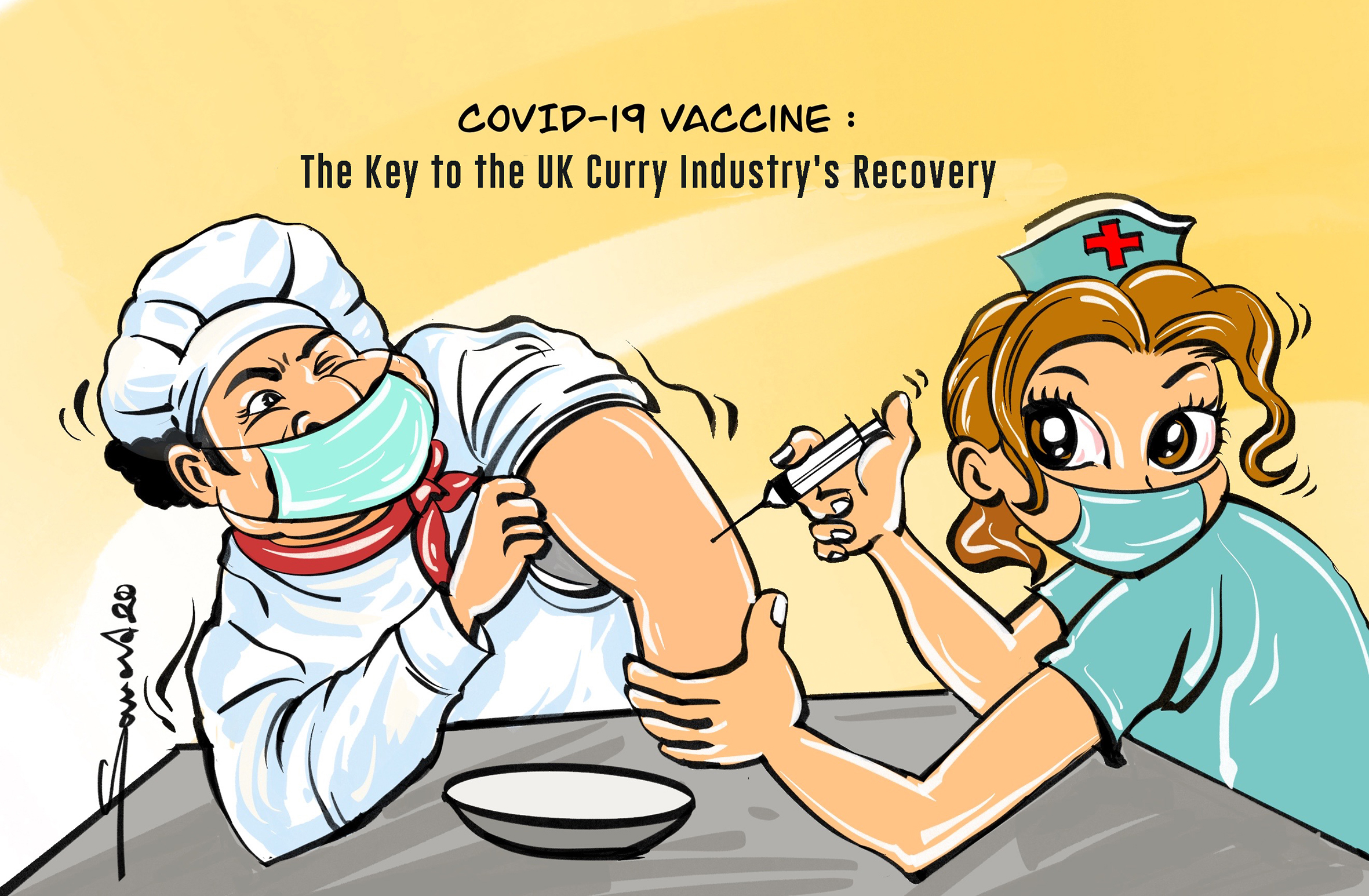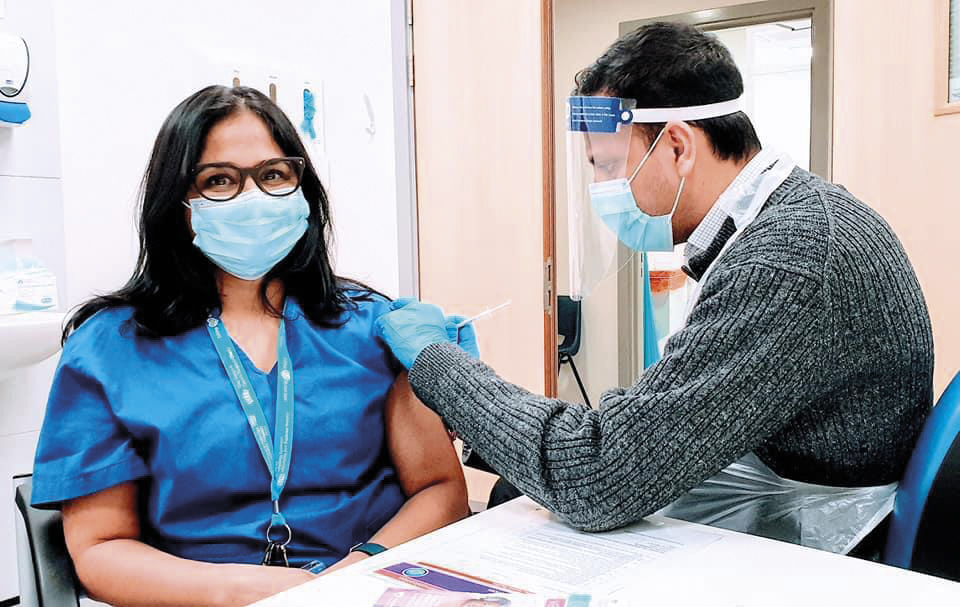
Like many other people across Britain, Curry Life celebrated when we heard the news that the UK had become the first country in the world to approve a vaccine for COVID-19. But we recognise that a lot more work still needs to be done. It’s clear that there’s a long road ahead, for the country and the curry industry.
The UK has seen two separate COVID spikes since March and without the vaccine, a third looks probable. It seems clear to us that this virus isn’t going away until the vaccine is widely distributed. Once it is, then restaurants will be able to open again, hopefully returning to normal at some point during 2021.
There’s no getting away from how destructive the pandemic has been to the Curry Industry and the wider hospitality sector that it’s part of. But the vaccine finally offers some hope for all of us in the restaurant trade. While it may be too late to save some businesses, the vaccine will be the difference between recovery and closing forever for many others.
This is why we celebrate its creation and look forward to a speedy distribution. Like most people, Curry Life trusts science and supports our medical community. We have full confidence in the Pfizer vaccine despite the misgivings of some conspiracy theorists. We trust experts, medical science and doctors completely; therefore, we pay no attention to vaccine sceptics. We’d also encourage others to take the same approach.
However, it’s more than just our respect for medicine and those who practice it that make us support the vaccine; we also think it will be vital to repairing our industry. The restaurants and restaurant owners have an interest in the vaccine’s widespread use. The more people who take it, the safer the country will be from COVID, meaning our customers can return with minimal risk of infection, allowing us to open our doors and welcome them back.
For this reason, the curry industry needs to get behind the vaccine and recognise it as the beacon of hope that it is. This also means opposing efforts to discredit the vaccine and educating those we care about on its importance. The curry industry wants an end to this pandemic, not just to save lives, but to save our businesses. The longer it goes on, the more risk there is to both.
British Bangladeshis have also been confirmed to be the people most at risk of dying from COVID-19. As many restaurant and curry house owners are of Bangladeshi origin, this makes vaccination so much more important. Especially for those of us who are over sixty or who have pre-existing health conditions. Ensuring our families are vaccinated against the virus and encouraging our employees to make sure they are too, ultimately reduces the risk of infection.
In fact, people from all minority ethnic backgrounds are statistically more at risk of dying from COVID. This has led some to ask if this needs to be factored into the rollout of the vaccine. If certain ethnic groups are more at risk than others, should they be given the vaccine sooner?
The Royal College of General Practitioners even wrote to the Health Minister Matt Hancock to inquire why this wasn’t the case. The letter was written by Professor Marshall of the RCGP saying, “Throughout the pandemic, the RCGP has raised significant concerns about the extent to which GPs, their practice staff, and patients from black, Asian and minority ethnic communities are disproportionately affected by Covid-19.”
“As you are aware, data shows that death rates from Covid-19 are among the highest in patients from black, Asian and minority ethnic communities, yet we note that they are not included on the initial JCVI prioritisation list ahead of the roll-out of the vaccines.”
The Professor went on to highlight the statistics and explained his reasoning behind the question; doctors all over the UK will need to explain the government’s thinking to their BAME patients. Letters from other experts have also questioned if the government has considered rolling out the vaccine on a socio-geographic basis, i.e., prioritising those who live in areas most at risk of COVID infection.
LBC presenter David Lammy pointed out on his radio show that Matt Hancock and the government have acknowledged the additional risk COVID poses to people from BAME communities. So why has this not been referenced in any way on the priority list?
This is especially worrying when a report by the Guardian revealed that people from BAME backgrounds are less likely to seek out the vaccine. This could make life harder for the curry industry if accurate, so Curry Life hopes this does not turn out to be the case. Curry Life approached the government’s Joint Committee on Vaccinations and Immunisation for comment, particularly to find out why people from BAME backgrounds have not been added to the priority list. Their first response was:

“The JCVI’s advice on COVID-19 vaccine prioritisation was developed with the aim of preventing as many deaths as possible. As the single greatest risk of death from COVID-19 is older age, prioritisation is primarily based on age. It is estimated that vaccinating everyone in the priority groups would prevent around 99% of deaths from COVID-19.”
They then referred us to comments made by Professor Wei Shen Lim, the COVID-19 Chair for JCVI, who said: “There is clear evidence that certain Black, Asian and minority ethnic groups have higher rates of infection, and higher rates of serious disease, morbidity and mortality. The reasons are multiple and complex.”
“Tailored local implementation to promote good vaccine coverage in Black, Asian and minority ethnic groups will be the most important factor within a vaccine programme in reducing health inequalities in these groups.”
Curry Life continued to press the JCVI for specifics on why BAME people had not been prioritised, despite data from the ONS and their own Professor Lim supporting the fact that people from BAME backgrounds are most at risk from COVID-19.
We also asked the JCVI to elaborate on how they were planning to facilitate the “tailored local implementation”. As well as how this would be enabled – and by whom. We were told, “The ‘tailored local implementation’, as the term implies, would be different in different places. The NHS is responsible for the deployment of the vaccine.” We were then encouraged to speak to the NHS on how this would be carried out in each region.
The JCVI then provided us with the following information about the government’s position on vaccination priority when it comes to people from BAME backgrounds, saying:
“There is no strong evidence that ethnicity by itself (or genetics) is the sole explanation for observed differences in rates of severe illness and deaths. What is clear is that certain health conditions are associated with increased risk of serious disease, and these health conditions are often overrepresented in certain BAME groups.”
“It is also clear that societal factors, such as occupation, household size, deprivation, and access to healthcare can increase susceptibility to COVID-19 and worsen outcomes following infection. These factors are playing a large role in the inequalities being seen with COVID-19.”
They went on to say that BAME people are being prioritised but based on geographical location and individual circumstances. However, we were quick to point out that this applies to everyone in the UK, not just those from BAME backgrounds.
“Good vaccine coverage in BAME groups will be the most important factor within a vaccine programme in reducing inequalities for this group. Prioritisation of persons with underlying health conditions will also provide for greater vaccination of BAME communities who are disproportionately affected by such health conditions.”
“The committee’s advice is for NHS England and Improvement, the Department of Health and Social Care, Public Health England and the devolved administrations to work together to ensure that inequalities are identified and addressed in implementation.”
“This could be through culturally competent and tailored communications and flexible models of delivery, aimed at ensuring everything possible is done to promote good uptake in BAME groups and in groups who may experience inequalities in access to, or engagement with, healthcare services. These tailored implementation measures should be applied across all priority groups during the vaccination programme.”
The good news is that anyone from a BAME background who is of advanced age or who suffers from a health condition that could make COVID more dangerous to them, are indeed first in line when it comes to getting a COVID vaccine.
However, no additional priority is being afforded to people from BAME backgrounds simply based on their heritage. The government acknowledges the additional risk but believes this will be factored into their vaccine rollout in its current form – and at a local level. We sincerely hope this is the case. Curry Life would like to encourage all our readers to seek out the COVID-19 vaccination when the time comes. Hopefully, this will help protect our industry from the virus once and for all.